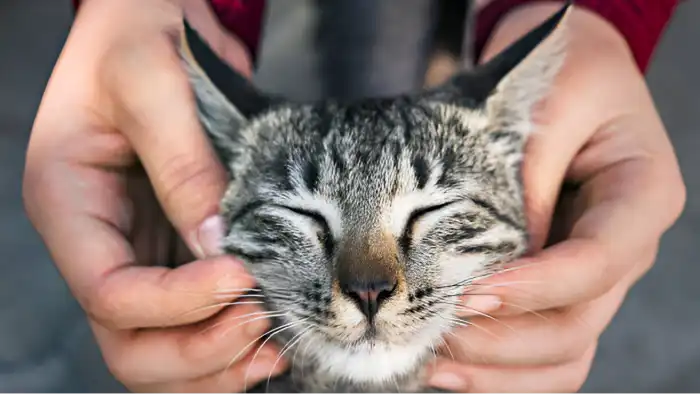How do cats say “I’m sorry”? Looking at a domestic cat that has accidentally knocked a vase over, scratched you without warning, or even is in a phase of ignoring can make them wonder if they feel remorse over their actions.
Their apologetic gestures would incorporate slight changes in their movements, increased affection, and alterations in actions. In this article, we will look at how astonishing it is for a cat translator to interpret a cat’s way of repenting and stick to the question.

Can Cats Say Sorry? What It Means!
How do cats say “I’m sorry”? The cat’s form of communication incorporates actions, vocal sounds, and movements of the body. While dogs are well-known for their wanting of validation, cats are much more solitary, which means their actions are predicated on:
- Recall History – A cat that has been scolded in the past may respond to certain scenarios differently.
- Relationship with the owner – Cats that are more bonded with their owners tend to purr more when “apologizing”.
- Individual Difference – Some cats tend to be more vocal than others.
For cats, it is not so much about feeling remorse but rather trust repair and assurance that they still have a good standing with their owners.
Do Cats Feel Guilty? The Truth!
Most cat owners tend to assume that cats feel guilt after their wrongdoing. But do cats feel guilt? In reality:
- They do not feel guilt like most humans do – They are unable to differentiate right from wrong like we do.
- They react to your feelings – They may try to calm you down if they know you are upset.
- They have a behavioral system based on cause and effect – They learn to avoid actions that will lead to negative consequences.
Thus, it is understandable why it may seem your cat knows how to say “I’m sorry”, but their behavior is more associated with getting rid of negative reactions rather than being remorseful.
Signs Your Cat Is Saying Sorry
Even though cats can’t utter an apology, they will do affectionate gestures in an attempt to ask for forgiveness.
1. Slow Blinking – A Cat’s Way of Showing Peace
How Do Cats Say “I’m Sorry”? Cats have their peculiar methods of displaying affection which include slow blinking. Based on what was mentioned, if one pays attention, one can notice that this form of slow blinking is a cat’s way of apologizing. For example, when a cat does something naughty, and after some time turns to you and blinks slowly, then it means that what they are trying to say is:
“Is it okay if we continue to remain friends?”
2. Nuzzling and Head Bumping
Head butting and nuzzling display affection in a feline way. This action, referred to as bunting, indicates:
- “I trust you.”
- “I feel safe with you.”
- “We are fine, aren’t we?”
If your cat engages in bunting after acting out, it could be their way of trying to fix your relationship.
3. Bringing You Gifts (Even If They’re Unpleasant!)
Have you ever found a toy, a sock, or even a dead insect on your bed? While it may seem odd, how do cats say “I’m sorry”? One way is by offering a gift as a sign of goodwill.
Here’s what different gifts might mean:
| Gift Type | Possible Meaning |
|---|---|
| Toys | Seeking forgiveness through play |
| Prey (real or fake) | Instinctual offering to strengthen your bond |
| Random objects | Seeking attention and connection |
So, if your cat drops a toy mouse at your feet after swiping at you, they might be trying to say, “Let’s make up and play!”
4. Keeping Nearby and Tagging Along
Cats are self-sufficient animals. Nevertheless, if they begin to stalk you everywhere, then they might need to reconnect. You may notice some of the following behaviors from your cat:
- Keeping close, not looking for any kind of contact.
- Entering the room and getting comfortable.
- Sleeping in closer proximity than usual.
This quiet form of company is another way to say “I care about you, and I’m still here.”
5. Grooming: A Cat’s Way of Saying ‘I Love You
In case you’re inquiring, how do cats say “I’m sorry”? they express this by grooming themselves or other people. If a cat licks your face or hands, it is its way of saying that it is sorry. A cat that grooms itself in your presence treats you as a friend and a person it trusts.
Tip: Cats groom themselves as a stress coping mechanism, so if your cat tries to reset the scene after ‘misbehaving’ or displaying aggression, it could be trying to destress.
Understanding how cats apologize helps you bond with them better. Pay attention to their actions, and you’ll know when your furry friend is saying, “I’m sorry.”
How to Know When Your Cat Says Sorry
Cats don’t say “I’m sorry” like humans, but they have their way of making amends. Watch for small gestures like slow blinks, nuzzles, or staying close. b
1. Reward Your Cat When They Say Sorry
- Slowly blink back at them – This tells them that all is okay.
- If they look like they want to be around you, give them a light pet.
- Let them know that you are not angry in a soft, soothing voice.
2. Don’t Scold or Be Mean
Unlike us, cats view punishment differently. As alternative methods:
- Modify their behavior – Show them a scratching post if they attack the furniture.
- Avoid unwanted Behavior – Not paying attention sometimes works miracles.
- Acknowledge Bad Behavior – Treats and good words do wonders!
3. Create a Safe and Calm Space
If your cat misbehaves often, try doing the following:
- Providing Safe Spaces and Hiding Sectors.
- Having a Schedule for feeding and playing.
- Engaging in Soft Play with them to burn off some energy.
When wondering How do cats say “I’m sorry”? Remember that they show it through actions, not words. Understanding their signals helps strengthen your bond and build trust.
Conclusion
How do cats say “I’m sorry”? While they do not feel guilt as humans do, they resort to other measures that help show their apology. By noticing body communication and positively reinforcing gestures as well as facilitating an environment without stress, you can enhance the relationship you share with your pet.
Next time your cat rubs against you, trails after you, or offers you a slow blink, consider it a sincere apology from a furry friend—so go ahead and love them back!
